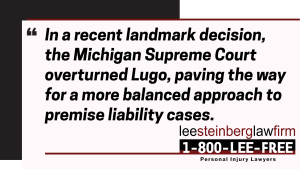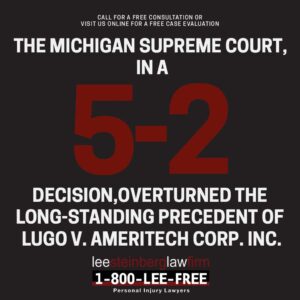The “Open and Obvious” Clause

In 2001, the Michigan Supreme Court handed down a decision that completely altered the landscape of slip and fall law – the infamous Lugo vs. Ameritech Corp, Inc. case. The ruling seemed to favor property owners in a way that many considered damaging to the rights of plaintiffs seeking justice. For over two decades, countless individuals were denied their proverbial day in court due to the “open and obvious” law in Michigan introduced by Lugo. However, in a recent landmark decision, the Michigan Supreme Court overturned Lugo, paving the way for a more balanced approach to premise liability cases.
The Lugo Ruling: Turning Slip and Fall Law on Its Head
Under normal premises law, a landowner is obligated to exercise reasonable care in protecting invitees from dangerous conditions on their property. However, the Lugo decision shifted the burden of responsibility by stating that if a danger was “open and obvious,” the landowner had no duty to remove it. In other words, if a reasonable person could have noticed the hazard upon casual inspection, the landowner was not liable for any resulting harm.
This ruling had significant consequences for plaintiffs, especially in cases where dangerous conditions were not immediately apparent. For instance, if a grocery store left spilled pudding on the floor, and a customer’s attention was focused on the upper shelves, the store might escape liability for any injuries resulting from the pudding spill. This interpretation of the law effectively removed the duty of care owed by property owners, leading to a lack of negligence claims and compensation for injured parties.
The “Special Aspect” Analysis: Further Erosion in Premise Liability Cases
As if the “open and obvious” law in Michigan was not enough, the Lugo case introduced an additional hurdle for plaintiffs to overcome – the “special aspect” analysis. According to this analysis, certain dangers with “special aspects” might not be considered open and obvious as a matter of law. These “special aspects” could be either dangers posing a uniquely high likelihood of harm or risks that were effectively unavoidable.
Unfortunately, meeting these exceptions proved extremely difficult in practice, leaving many victims without recourse. In one particularly egregious instance, a judge deemed accumulated water on a restaurant bathroom floor open and obvious, even to a blind man. This decision, known as Sidorowicz vs. Chicken Shack Inc., is widely regarded as one of the worst post-Lugo opinions, highlighting the detrimental effects of the ruling on premise liability cases.
The Demise of Lugo: A Landmark Decision

After more than two decades of grappling with the ramifications of the Lugo case, the Michigan Supreme Court finally laid it to rest in 2023. In a consolidated opinion involving the cases of Kandil-Elsayed vs. F & E Oil, Inc. and Pinsky vs. Kroger Co. of Michigan, the court overruled Lugo. The key change was a shift in the analysis of whether a condition was open and obvious: it would now be considered in terms of the plaintiff’s comparative negligence, rather than the premises owner’s duty or the plaintiff’s contributory negligence.
The court reasoned that contributory negligence had been abolished by legislative action, and the relevant statute required the court to reduce a plaintiff’s damages by the percentage of their fault. This decision ensured that the question of whether a condition was open and obvious remained relevant, but only in assessing the degree of the plaintiff’s fault.
What This Means Moving Forward
The Lugo case significantly impacted slip and fall law in Michigan for over two decades, favoring property owners and making it difficult for many plaintiffs to seek compensation for their injuries. However, with the recent landmark decision in Kandil-Elsayed vs. F & E Oil, Inc. and Pinsky vs. Kroger Co. of Michigan, the state’s Supreme Court has finally restored a fairer balance to premises liability law. The ruling ensures that plaintiffs are not unjustly denied their day in court and marks the end of a long-standing battle against the Lugo decision.
Contact Lee Steinberg Law Firm
If you’ve been injured in a slip and fall accident in Michigan, contact Lee Steinberg Law Firm. We are very experienced in slip and fall cases, and we can help you get the compensation you deserve. Call us at 1-800-LEE-FREE or contact us on our website to schedule your free consultation.

